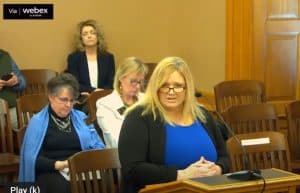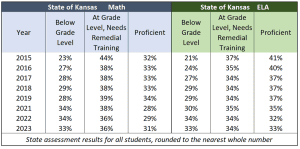Imagine, if you will, entering the Kansas State Capitol Visitor Center and beginning the long walk through an underground stone hallway. You are about to enter another dimension where fiction often rules, objections frequently are not the real objections and common sense is checked at the door. Welcome to The Twilight Zone.
Many school superintendents and their allies are out in force, lobbying to scuttle legislation that removes barriers preventing school board members from fulfilling their legal obligations to conduct annual needs assessments in each school and otherwise work to improve outcomes. Education officials and some legislators vociferously oppose the changes, claiming they violate sacrosanct local control, subject districts to cyber attacks, and devolve public education into chaos.
Pretty much everyone knows those are not the real objections in The Twilight Zone, but many go along, tsk-tsking with furrowed brows.
Each policy change is requested by board members who tell one story after another, with superintendents refusing to allow them to fulfill legal obligations and board presidents refusing to allow public discussion of issues important to parents. Some districts will not allow board members to visit schools without an administrator looking over their shoulder and prohibit board members from engaging with parents during the public comment period at board meetings.
USD 453 Leavenworth Board Member Vanessa Reid testified, “On our board, we are not allowed to engage in any way with public comment. We are not supposed to make any sign whatsoever, physical or verbal, that we agree or do not agree.”

Amy Cawvey, a board member at USD 469 Lansing, testified that the board president rejected her requests to bring up matters for discussion at board meetings.
Some districts do not publish board member email addresses and instead require contacts to go through the district office. That creates at least the potential for some emails to be trashed, and it has a chilling effect on parents who need to speak confidentially with a board member.
The Kansas Association of School Boards preposterously alleges that publishing board member email addresses will subject districts to cyber attacks, even though districts routinely publish staff emails. Objections don’t have to make sense in The Twilight Zone because some legislators and media dutifully repeat even the most illogical and unproven claims.
Reid also testified that the USD 453 board is given misleading information by district administrators, giving the impression that achievement is higher than the sad reality – only 12% of students are proficient in math and just 21% in English language arts. And that is what is at the heart of the issue.
Local control is too often merely a shield or a bludgeon used by those who support institutions and organizations representing the adults in the system instead of putting students first. For example, Rep. Jerry Stogsdill (D-Prairie Village) introduced legislation last year to require that school districts provide due process for teachers. School districts opposed mandatory due process, wanting to make that decision on a district-by-district basis, but Stogsdill, a three-term President of the Shawnee Mission teacher union, wanted a state mandate that served his interests. Yet he trots out the local control shield on policies he doesn’t like because that’s how things work in The Twilight Zone.
Many matters rightfully are left for local school boards to decide. However, local control should not take priority over meeting students’ needs, and it does not supersede the Legislature’s constitutional obligation. Article 6 § 1 says, “The legislature shall provide for intellectual, educational, vocational and scientific improvement by establishing and maintaining public schools, educational institutions and related activities which may be organized and changed in such manner as may be provided by law.” (emphasis added)
 State assessment results and ACT scores show a steady decline in outcomes since the State Board of Education began de-emphasizing academic preparation in 2015. The 2015 ACT showed that 32% of Kansas graduates were college-ready in English, Reading, Math, and Science; now, only 19% are college-ready. Only about one in three are proficient in reading and math on the state assessment, and Kansas has gone from having about one-quarter below grade level in 2016 to one in three now. In The Twilight Zone, these miserable outcomes are ignored whenever possible and otherwise characterized as ‘making progress’ without mentioning specifics.
State assessment results and ACT scores show a steady decline in outcomes since the State Board of Education began de-emphasizing academic preparation in 2015. The 2015 ACT showed that 32% of Kansas graduates were college-ready in English, Reading, Math, and Science; now, only 19% are college-ready. Only about one in three are proficient in reading and math on the state assessment, and Kansas has gone from having about one-quarter below grade level in 2016 to one in three now. In The Twilight Zone, these miserable outcomes are ignored whenever possible and otherwise characterized as ‘making progress’ without mentioning specifics.
The Constitution calls for improvement, which obliges the Legislature to step in and remove barriers to improvement erected by the Kansas Department of Education, the State Board of Education, or local boards and administrations that won’t act to “improve” student opportunities.
Improving outcomes isn’t valued in The Twilight Zone
The institutional interests opposing legislative changes generally don’t deny preventing board members from visiting schools, not allowing them to conduct needs assessments as required in state law, and other issues addressed with legislative proposals. They want students to succeed, but not if it means that adults in the system must change their behaviors.
Some changes may inconvenience the adults, but how will students get the education they deserve by preventing open, frank discussions of barriers to proficiency?
Acknowledging low proficiency levels isn’t about finger-pointing. All parties should adopt the position that no one is to blame, but everyone is responsible for driving improvement. Board members need direct input from teachers, principals, and the community, not filtered through district management or in a summary report to rubber-stamp.
The Twilight Zone atmosphere is not new. Our 2022 book documented story after story of education officials deceiving parents about achievement and funding, de-emphasizing academic preparation, ignoring state laws designed to improve outcomes, and rejecting input from the community.
One story is particularly telling. Parents were very upset in 2012 when the USD 259 Wichita school board was preparing to close some schools and build new ones in different parts of the city. Board President Betty Arnold admonished the audience, stating, “This board meeting is held in public, but it is not for the public, or of the public.”
Away, peasants. There is no place for you in The Twilight Zone.
Many legislators fear election challenges if they stand up for students
If legislators know they are being fed a load of malarkey, why do they go along with the charades, you ask?
Quite simply, the education establishment carries a lot of sway in elections. Legislators know they will be targeted if they put students first, so some of them find excuses to choose the system over students. Principles frequently shift to preferences in The Twilight Zone.
The point of all this is that parents cannot count on education officials to deal with the student achievement crisis. Change (sadly) takes time, but solid progress has already been made.
- Open enrollment starts in the Fall, allowing students to attend a district of their choosing as long as capacity exists.
- The 2022 Every Student Can Read Act requires school districts to implement programs to ensure that third-graders achieve competencies in phonics, vocabulary development, reading fluency, and reading comprehension.
- The tax credit scholarship program allows more than 1,000 low-income students to attend a private school each year.
- Some districts have embraced the building needs assessment process and are actively developing plans to reallocate resources to improve outcomes.
School board members across Kansas are getting help from the Kansas School Board Resource Center, which, like The Sentinel, is a subsidiary of Kansas Policy Institute. KSBRC provides student-focused training, model policy, and guidance they can’t get anywhere else, and services are free, so board members don’t have to take money away from classrooms.
Many episodes of The Twilight Zone ended with a moral, and in that spirit, here’s the lesson we must all learn: student outcomes won’t change until adult behaviors change, so keep up the pressure on those charged with seeing that your children and grandchildren are properly educated.



